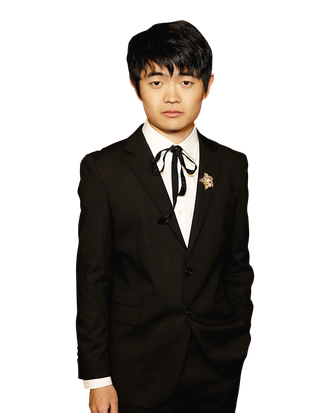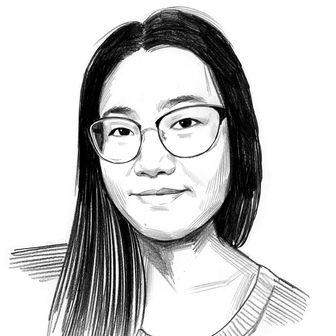
Spoilers follow for American Born Chinese season one.
American Born Chinese helped Ben Wang exorcise some demons, and we don’t just mean the Disney+ series’s mythological deities. Early high school “wasn’t the best time” for Wang, so playing extremely self-conscious sophomore Jin for his first lead TV role felt a little like reliving that time in his life.
“There’s something kind of empowering about that,” Wang says. “They yell ‘cut,’ and then you step out and you’re back to your older, more self-actualized version.” The show, adapted from Gene Luen Yang’s acclaimed 2006 graphic novel of the same name, sees Jin grappling with his Asian American identity and dealing with the tension between his immigrant parents. Also, a battle over a kung fu–filled heavenly realm has descended to earth. It’s a lot to take in, and that’s before we even start name-dropping all the on- and off-screen talent, from Oscar winners Michelle Yeoh and Ke Huy Quan to Shang-Chi director Destin Daniel Cretton.
By his own count, Wang has “only three brain cells,” which he put to work while talking with us about his charmingly awkward character’s growth across eight episodes, the Everything Everywhere All at Once comparisons, and the one thing he doesn’t want to happen after this season’s cliffhanger.
You’ve said in interviews that you cried when you read the graphic novel during the audition process. What parts did you connect with?
I grew up in a small rural town in southern Minnesota, cornfields in every direction. So I feel like the social norms for Gene living in the Bay Area in the ’90s may have been not too different. [Laughs] In the book, Jin grew up in Chinatown with other Asian boys, and then he moved somewhere around first grade to this town that was predominantly white. He was one of two Asian kids, period. And it was the exact same for me. Instead of Chinatown, I moved from Shanghai when I was 6. I was, like, the only Asian kid in my class until sixth or seventh grade. I had that exact haircut; I had that terrible shirt. My mom did just buy me everything secondhand from the Used-a-Bit Shoppe. The conversations felt perfectly analogous to my own situation growing up, despite the fact that they were written by someone whom I had never met, who grew up in a completely different part of the country and a few decades earlier.
In the book, Jin’s desire for assimilation leads him to hide as a white character who has a Chinese caricature of a cousin named Chin Kee. How did you feel about the TV show removing that story line?
I’ve spoken to Gene about this — when that book originally came out in 2006, not everybody got that Chin Kee was like this grotesque representation of all the worst stereotypes about Asian Americans. People would come up and say, Oh, that character is so cute. Why isn’t he a plushie? Why isn’t he on a T-shirt? I do think the conversation has moved forward today, where I think pretty much every single person who would see that original character would go, Yeah, this is wrong.
The show takes that character and adapts it into Key Huy Quan’s character, Freddie Wong, this character from an ’80s sitcom. Because that’s exactly where the conversation is today. I’ve met people who still don’t understand why the character Long Duk Dong is problematic. That’s why I think that’s right where this show needs to be. This is really how many Asian Americans were portrayed in television and film in the last 20, 30 years, and then it cuts to Jin watching it — that cuts between the characterization and the real effects it has on real people in the real world. That juxtaposition tells the story, and it teaches that lesson to people who might not get it.
Jin often tries to avoid conflict. How did you approach the scenes where he does decide to be more confrontational, like when he tells his parents to stop fighting or tackles Travis? What’s going on in Jin’s head?
This is gonna sound a little bit hoity-toity theater-y, but it’s like Hamlet, you know? [Laughs] It’s a young person who doesn’t really understand how much power he can have. When we’re young and inexperienced in the world, we feel like power and confidence are things that have to be earned somehow. It’s something that we have to be given, or we know when we have it, but in reality, a lot of that stuff is sort of manufactured. You create confidence internally. And that’s the lesson that Jin learns from Wei-Chen throughout the series. The writing so brilliantly maps this arc of Jin being at a place where he feels like he can’t do anything or doesn’t have the power to do anything — and then he meets people. He meets friends, he meets teachers. He has conversations with his parents, he has conversations with Oscar-winning actors and actresses. And through those conversations, he learns about who he thought he wanted to be, who he might actually want to be, and who he can be.
The show has several story lines that Jin doesn’t see — he never goes to the heavenly realm, for example. Did you still get to watch the filming of scenes you weren’t in?
We shot a lot of it at the studio on set in one of those big airplane hangars. They built a bunch of sets on the same soundstage. It would be like, you wake up in the morning and you’d go, and they’d have a perfect one-to-one re-creation of a classroom, and I’d be mumbling to my crush. And then Destin [Daniel Cretton] would go, Okay, great, cut. And then he’d move, like, three feet over to the next set where Michelle Yeoh is fighting a bull demon and there’s feathers and wires and pyrotechnics. Then he’d go, Okay, great, cut, and he’d move over again to the sitcom set, which is also on the same stage. They’re all, like, facing each other, so there was some whiplash going on. Seeing all those things being filmed in tandem, it was wild. It was like jumping between worlds.
That kind of makes me think of Everything Everywhere All at Once. Obviously there are some cast members in common, but American Born Chinese’s recurring idea that everything is connected also feels thematically similar. I was wondering if you also felt that way.
I was so overwhelmed and emotional the first time I watched the movie, I couldn’t draw any parallels to anything.
You watched it with Ke, right?
Yeah. With Ke and the rest of the crew and cast of American Born Chinese, ’cause he threw a big screener at a theater for everyone. Isn’t that just the most Ke thing you can think of? So, so sweet.
I’ll be honest, I didn’t see the parallels right away. But you’re right, there is sort of this idea of different worlds but all of them being connected. I think maybe it has something to do with the fact that it’s an underlying narrative in the Asian American community, or just immigrant communities in general. Because growing up, when I was at home with my mom celebrating the Lunar Festival, and then the next day I’d go over to my friend’s house and have a sleepover with his giant golden retriever and eat doughnuts for breakfast, it did feel like jumping between worlds. It did feel like you live in two or three or four different places that are completely separate from one another and don’t talk to each other. And I think both Everything Everywhere All at Once and American Born Chinese are about reconciling those worlds with one another. That we don’t have to feel like we’re living in separate worlds and jumping between them; we can be in all of them at the same time. And that’s okay, and there’s something actually very beautiful about that.
Have your own parents seen the show yet?
Nope.
Given that there are similarities to your own life and childhood, do you have any expectations around their reactions?
I don’t know. I think my mom will watch the show for sure. My mom’s in China right now. I don’t think there’s Disney+ there, so I’ll have to get some sort of link for her. And my dad … yeah, it’ll be interesting. My parents divorced when I was 4, and I came to the States with my mom. She raised me as a single mother, and I’m an only child. So in a way those scenes with both the mom and the dad were — at first, it was a little bit like, Oh man, I never really grew up with a dad in the house; I wonder if it’ll be difficult for me to understand what that relationship is. And then Chin Han showed up, and immediately I was like, Oh, this is perfect. I actually completely understand what it’s like to have an Asian dad: It’s a guy in the house, but you don’t know him really well and you’re like, I wonder if he likes me or not. Chin Han is a lovely person, but he plays that role so well that the father-son awkwardness just came out naturally. In a way that I know is truthful because I checked in with, you know, people who did have dads. [Laughs]
The season ends with Princess Iron Fan telling Jin to come with her if he wants to see his parents again. How do you feel about that cliffhanger? It certainly opens up room for another season where Jin could get to do more action.
Potentially. I hope not, honestly. I was so gung-ho about wanting to do action when the show started. I was like, Please, please, please put me in wires. And then they did it once for the last episode, and I was like, I never want to do that again. That was the most painful thing I’ve done in my life. They strap you into this thing that I will only refer to as an iron diaper, and it constricts you right where you don’t want to be constricted. So I hope there’s a second season, but I hope Jin continues to be a meek little boy on the ground trying his best.
This interview has been edited and condensed.





